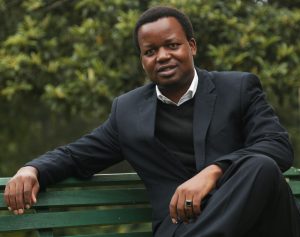
For the last few months, the SmokeLong team have had the pleasure of having John O. Ndavula on staff as our Kiswahili editor and translator. The story he chose appeared in issue 61, out now. John has recently published a book about the effects and uses of social media in Kenyan politics.
___________________
Allen: John, first of all thank you so much for choosing the Kiswahili story for the September issue of SmokeLong Quarterly. This is a busy time for you. Twitter is exploding with pictures and videos of you on Kenyan morning TV. Congratulations on the publication of your book, Social Media & Political Campaigns in Kenya!
Ndavula: I was planning for my book launch while I read the Kiswahili submissions. So yes, it was a bit tough for me. My new book arises from the research I conducted in my doctoral studies. It is the first book in Kenya to explore the relationship between digital networking sites and contemporary Kenyan politics. Digital communication is an emerging area in communications and I am excited that I have contributed to this area of research.
Allen: What would you say are the demographics of internet usage in Kenya?
Ndavula: Most users of the internet in Kenya are the youth. According to statistics, the internet user penetration among the youth is over 60 percent. Of these, the youth who have five years or more of using the internet stand at 20 percent. The youth in urban areas have a greater access to the internet than those in rural areas.
Allen: In your research for the book, you spoke with Kenyan political candidates. Did they welcome your research?
Ndavula: Most younger politicians were enthusiastic about the study. However, some older politicians who have run their campaigns for many years without using social media were mostly skeptical.
Allen: I read on Twitter that political candidates in Kenya started using social media in earnest in 2013. What do you predict for the future?
Ndavula: I think more political candidates will use the social media platform for their campaigns in future. Candidates who are not flexible enough to adapt their campaign strategies to the continuously evolving digital world may lose out on younger voters.
Allen: Of course you’ve seen how the Trump campaign allegedly misused social media to manipulate voters. Do you think the same danger exists in Kenya?
Ndavula: It is quite easy to spread hate, disinformation, hoaxes and fake news on Facebook and Twitter. Kenya tends to be polarized along ethnic lines during general elections and social media could be used by political actors to fuel this animosity.
Allen: To bring the discussion back to flash fiction, are there journals in Kenya who are catering for an online audience?
Ndavula: We have a couple of journals like Kikwetu, Enkare, and Jalada which have dramatically expanded the literary space in Kenya. The journals provide writers with a publishing platform at a time when most mainstream publishers are either closing shop or focusing on school textbooks.
_________________________
 John O. Ndavula is the author of Social Media and Political Campaigns in Kenya. Ndavula is also a fiction writer whose prose has appeared in Kikwetu. He is co-founding editor of Kikwetu: A Journal of East African Literature and has published literary criticism books on East African and European fiction. He teaches creative writing at St. Paul’s University in Kenya. He earned his PhD in Mass Communication from Jomo Kenyatta University of Agriculture and Technology in Kenya.
John O. Ndavula is the author of Social Media and Political Campaigns in Kenya. Ndavula is also a fiction writer whose prose has appeared in Kikwetu. He is co-founding editor of Kikwetu: A Journal of East African Literature and has published literary criticism books on East African and European fiction. He teaches creative writing at St. Paul’s University in Kenya. He earned his PhD in Mass Communication from Jomo Kenyatta University of Agriculture and Technology in Kenya.
Christopher Allen is the co-editor of SmokeLong Quarterly.

 The core workshop of SmokeLong Fitness is all in writing, so you can take part from anywhere at anytime. We are excited about creating a supportive, consistent and structured environment for flash writers to work on their craft in a community. We are thrilled and proud to say that our workshop participants have won, placed, or been listed in every major flash competition. Community works.
The core workshop of SmokeLong Fitness is all in writing, so you can take part from anywhere at anytime. We are excited about creating a supportive, consistent and structured environment for flash writers to work on their craft in a community. We are thrilled and proud to say that our workshop participants have won, placed, or been listed in every major flash competition. Community works.